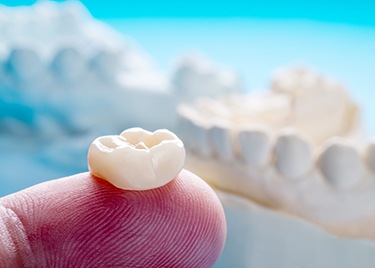Dental Crowns Cumming
Customized Dental Crowns with Pain-Free Placement

Over the years, teeth can sustain decay, damage, and infections that put them at risk of becoming missing. Our team at Bragg Dental understands the value of your natural smile, which is why we always focus on preserving compromised teeth whenever possible. In many cases, this involves strengthening and protecting them with restorations like dental crowns in Cumming. Our dentists use a variety of high-quality materials like ceramic, zirconia, and porcelain to craft restorations that can flawlessly incorporate with your smile.
Why Choose Bragg Dental for Dental Crowns?
- Natural-Looking & Durable Dental Crowns
- Pain-Free Treatment with The Wand
- Conservative & Comprehensive Care
What Is a Dental Crown?

Dental crowns themselves are small, cap-like structures that are cemented over teeth with large fillings, that have been treated with root canal therapy, or are damaged. Dr. Bragg and Dr. McTier use high-quality dental ceramic, zirconia, and porcelain to create crowns that can stand daily wear and tear as well as have a natural aesthetic that blends in with surrounding teeth. In many cases, patients are able to preserve teeth that may otherwise further deteriorate or become missing had they not been protected.
The Dental Crown Process

After any primary treatments have been completed, like root canals, one of our dentists in Cumming will prepare the tooth for the restoration by removing a very small portion of enamel. This will allow the crown to fit atop the tooth while remaining aligned and even with surrounding teeth. We’ll take a digital impression of the tooth that will be sent off to our dental laboratory to craft the restoration. Once the permanent crown is finished, we’ll make sure that it fits your tooth perfectly and looks identical to your surrounding teeth before removing the temporary crown and cementing the new one.
Benefits of Dental Crowns

Dental crowns offer a variety of benefits, including:
- They’re custom-crafted to blend in with your smile instead of highlighting damaged teeth.
- Made from durable materials that don’t wear easily and can last for up to 20 years.
- Crowns prevent the need for tooth extractions or tooth loss, which can be more costly than preserving the natural teeth.
- They can protect and strengthen teeth, as well as be incorporated into dental prosthetics to replace teeth.
Understanding the Cost of Dental Crowns

A dental crown can protect and preserve a damaged tooth so you can continue using it to eat, speak, and smile normally. However, many patients want to know how much they can expect to pay for their treatment before committing to it.
Our Bragg Dental team is happy to provide a detailed estimate after we’ve examined your troublesome tooth at your consultation appointment. Continue reading to learn more about the cost is determined, and feel free to contact us for additional information!
Factors That Affect the Cost of Dental Crowns

The total amount due for your restoration depends on your unique circumstances. There are a few factors that influence your final invoice, such as:
- The severity of your condition. If your injured tooth has developed an infection, you will likely require a root canal procedure first, which comes with additional expenses.
- The type of material used. Your prosthetic can be made from various substances like durable porcelain, resin, gold, or amalgam mixtures of metal, which influences the price.
- How it’s made. Some providers use CEREC same-day technology to build restorations onsite, which can impact the rate.
Remember, when it comes to rebuilding your grin, the quality of a product is often reflected in its cost. You might pay more upfront for a well-made dental crown, but it may be more likely to resist chips, stains, and other potential problems so you don’t have to cover as many repairs over time.
Does Dental Insurance Cover Dental Crowns?

Many dental policies cover about 50% of the cost of major procedures that are deemed medically necessary to preserve your dental condition, like being fitted with a dental crown. However, every plan is different, and there’s no guarantee, so it’s worth verifying with your insurance provider.
Please let us know if you require assistance with claims or paperwork. Our office staff is familiar with different policies and is happy to help you maximize your available benefits.
Options for Making Dental Crowns Affordable

Your dental crown can preserve your damaged tooth to safeguard your smile for years, but many people worry that they can’t afford this popular treatment. However, our team doesn’t want y our budget to keep you from receiving the top-quality care you deserve.
As a result, we’ve partnered with a third-party financer, CareCredit, to help make this procedure more affordable. This program allows you to break up your final invoice into more manageable monthly installments if your application is approved.
If you still have questions about what you can expect to pay for your restoration, we’re happy to provide answers! Contact us to schedule your consultation, and our team will gladly share the different financial options for your consideration.
Dental Crowns FAQs
Are dental crowns permanent?
While dental crowns cannot be called permanent, they are certainly a long-term solution since they can protect your teeth for anywhere from five to fifteen years. However, the process that prepares your tooth to receive a crown is irreversible since it removes a small amount of enamel that will not grow back. These devices are designed to restore the appearance and function of compromised teeth, and they protect them from infection and injury so they can last much longer than they would otherwise. These appliances can be compromised by tooth decay, and crowned teeth are just as susceptible to infections as uncrowned teeth. To keep your restoration in great shape, remember to brush and floss daily, use antibacterial mouthwash regularly, see us at our Cumming office for regular checkups, and protect your smile from injuries by wearing an athletic mouthguard or a nightguard when necessary.
How long do dental crowns last?
Dental crowns can last between five and fifteen years depending on the material they are made from and the quality of the care they receive. While metal crowns sometimes last longer than metal-free ones, the difference is often negligible. Crowns placed towards the front of the mouth may last longer than those placed on the molars since they endure less pressure during the chewing process. To keep your crown in excellent shape for as long as possible, it’s best to practice excellent oral hygiene at home, visit our Cumming office for biannual exams and cleanings, and break bad oral habits like smoking and chewing on non-food objects like ice and pens.
Do dental crowns get cavities?
Since dental crowns are made from materials that cannot be metabolized by bacteria, they cannot develop cavities. However, the teeth wearing them can still be infected, and a tooth with a crown is just as likely to suffer decay as a tooth without one. Poor oral hygiene is the greatest risk factor for tooth decay, so it’s crucial to brush and floss every day while taking special care to clean along the seam between your natural enamel and your restoration. It’s equally important to see us at our Cumming office at least twice a year so we can monitor your oral health and address issues in their early stages.
Are dental crowns covered by insurance?
Insurance usually offers partial coverage for dental crowns, but it’s important to confirm what your policy will pay for before committing to any treatment. Typically, a plan will cover something between fifty and eighty percent of the treatment cost after the deductible is met and before exceeding the annual maximum. However, insurance will normally only cover a dental crown if it is necessary to preserve the patient’s oral health, so a crown placed for cosmetic reasons is unlikely to receive coverage. We know that it’s not always easy to fit the necessary dental restoration into your budget, so we partner with CareCredit to offer our patients flexible financing options that can break their bills into small monthly payments that are easy to manage.
